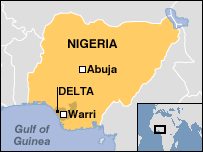And the news is not good.
Frightening violence in the northeast:
Thousands of Nigerian Muslims protesting against the Muhammad cartoons attacked Christians and burned churches in northeastern Nigeria, police and residents said.
At least 15 people were killed in the first major protest to erupt over the issue in Africa’s most populous nation.
Rioters burned 15 Christian churches in Maiduguri in a three-hour midday rampage on Saturday….
An Associated Press reporter saw mobs of Muslim protesters swarm through the city centre with machetes, sticks and iron rods. One group threw a tyre around one man, poured gas on him and set him ablaze.Chima Ezeoke, a Christian Maiduguri resident, said the protesters had attacked and looted shops owned by minority Christians.
“Most of the dead were Christians beaten to death on the streets by the rioters,” Mr. Ezeoke said.
Witnesses said that three children and a Catholic priest were among those killed.
 |
And rebel attacks in the south are having a
significant economic impact:
Militants holding nine foreign hostages in southern Nigeria destroyed an oil pipeline Monday and blew up a boat in violence that has cut about 20 percent of crude production in Africa’s oil giant.
The West African nation is reeling from weekend attacks in which militants blasted oil and gas pipelines and sabotaged a key oil loading terminal belonging to Royal Dutch Shell. That and an earlier attack has forced the company to halt the flow of about 455,000 barrels a day.
Nigeria is no longer another one of those African countries whose misery the rest of the world can ignore. Nigeria’s oil production was up to 2.7 million barrels a day by the end of last year, which puts it ahead of Kuwait, Iraq, Venezuela, or United Arab Emirates in terms of total production. Although global petroleum production was virtually stagnant during September through November compared with the same months of the previous year, Nigeria boosted its production 200,000 barrels a day, thanks in part to production from the new Bonga deepwater field. Exxon-Mobil’s Erha deepwater field had been expected shortly to begin making a similar contribution.
Nigeria, you see, had been an important part of the reason that some people had been suggesting that we had no worries about the near-term oil supply outlook.
Technorati Tags: oil prices,
oil,
Nigeria
It may be a bit misleading to suggest that poor Nigerians were objecting only to the cartoons!
A bit more political reality is needed here.
It is also significant that Nigeria is one of the world’s largest suppliers of light sweet crude which, as JDH pointed out in his post “Sweet and Sour Crude”, is essential for the production of gasoline.
But not to worry. I see by headlines about his energy speech that Bush says “the nation is on the verge of technological breakthroughs that would “startle” most Americans.”
Bush’s move is brilliant. The enviro whackos are always touting some garbage like batteries or solar power as a replacement for oil….so, give the fools some silly rhetoric about a “breakthrough”. Of course, the whackos – by hearing Bush tout this – realize how silly they sound. Face it, we are going to be using oil for quite a long time into the future gang. Bush “the idiot” uses jujitsu once again…using the libs.’ own naive energy rhetoric against them…brilliant…
I’m not sure I’d agree that smart politics in the pursuit of advancing flawed policy is all that admirable.
did not Hitler promise “vonder” weapons to win the war and that victory was “just around the corner”?
ha!
Meanwhile, over in the natural gas markets . . .
As oil prices reversed a downward trend and rose over the weekend on the news of more Nigerian political problems (James Hamilton explains why this is important), the roller coaster of emotions that is the natural gas market continued unabated….
If you’re looking for a little more background on the Nigerian situation, here’s a post by Dave over at The Oil Drum.
In reference to the oil drum, the realistic ratio of regular soldiers to guerillas was always 10 to 1 in the field. Since regulars needed a supply line, this added 10 more per in-country rifleman (per Viet Nam statistics). This means 100 tax paid military personnel to combat one dedicated guerilla (insurgent).
A remarkably consistent ratio of dead to wounded from Korea, Viet Nam, and the Gulf wars is 8 to 1.
This means that for the 2000 U.S. dead in Iraq, 16,000 U.S. soldiers are wounded (not to mention the blood bath of the Iraqi civilions).
Our miltary is now stretched to the breaking point.
Given this, and the antipathy of the abused population of the oil rich zones, how can our SUV dependent, negative saving, anti-body bag population possibly prevail against the real issues of survival faced by so many?
It may be a bit misleading to suggest that poor Nigerians were objecting only to the cartoons!
A bit more political reality is needed here.
Does this just apply to the first story in the article?? I think only the first story (Nigerian Muslim rioting) was related to the cartoons
I don’t think the poster meant to imply that the nigerian rebels attacking the oil pipeline was related to the cartoons. I think the post in general was just about Nigeria in the news. I may be wrong, or maybe I read Stormy’s statement wrong.